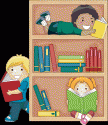How to Get Better at Reading

When you go to school, you learn many useful facts and skills that can be useful for you later in life. However, you might have learned the most important skill of all even before you went to school. The ability to read and to understand what you’re reading is so important that everything else depends on it. Even if you have trouble reading, you can help to improve your skills and make your other studies easier at the same time.
Suppose that you wanted to do a math problem or a science experiment. You would need to be able to read and understand what the words say before you could do anything else. Learning history or geography depends on being able to read. If you wanted to bake a cake or build a toy car, you would need to be able to read the directions. Almost everything we do depends on being able to read.
If your family is like most others, you probably grew up with at least a few books or magazines in the house. Your parents or older brothers and sisters probably read to you when you were little. You might even have learned to read for yourself before you went to school. One of the best ways of improving your skills is to have something to read near you whenever possible. Books, magazines, websites, and even cereal boxes and soup labels can be good reading materials for improving your skills.
Libraries are good places to find reading materials. It’s best to find something that you enjoy and that is close to your reading level. If you enjoy the sciences, you can find a book on those subjects at your reading level. If you enjoy exciting stories, you can look for books about real or imaginary adventures or even graphic novel versions of much more difficult books.
Finding something at your level that you enjoy and find interesting is the first step, but don’t forget to challenge yourself. You should also look for a time and place that suits you. Maybe you enjoy reading in bed for fifteen minutes before you go to sleep or after you wake up. Maybe the bus ride on the way to or from school is best for you, or maybe during lunch. Find a time that works for you and try to stick to that time.
Developing a large vocabulary is very important for learning how to read well, because authors use all kinds of words when they write. You might want to have a dictionary beside you while you’re reading and then write out any new words that you find. Later, you can memorize these words for the future. Notice the details in the text, because this will help you to understand it.
Learning to read well can take a lifetime, but with time and patience, you can already get a good start.
Bibliography:
Children Learning Reading.com. “How to Improve Reading Comprehension Skills in Children?” http://www.childrenlearningreading.com/teach-children-reading/improve-reading-comprehension-in-children.html#.WCHQ9CSwiSo.
Gisler, Peggy. “Top 10 Ways to Improve Reading Skills.” http://www.familyeducation.com/school/reading-activities/top-10-ways-improve-reading-skills.
Swanson, Beverley B. How Can I Improve My Child’s Reading? http://www.readingrockets.org/article/how-can-i-improve-my-childs-reading.
Wikihow.com. “How to Improve Your Reading Skills.” http://www.wikihow.com/Improve-Your-Reading-Skills.





Leave a comment!